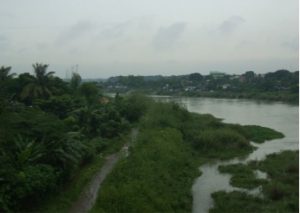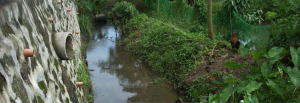Memo #299
By Sarah Thomas – sarah.thomas [at] alumni.ubc.ca
 Over 99 percent of all businesses in the Philippines are small and medium enterprises (SMEs) and they represent seventy percent of the country’s labour force. With such numbers, while the environmental impact of small and medium enterprises is not well known, one can surmise that it is substantial. Aging equipment, production inefficiencies, and lackadaisical compliance with environmental standards among these SMEs have significant cumulative effects.
Over 99 percent of all businesses in the Philippines are small and medium enterprises (SMEs) and they represent seventy percent of the country’s labour force. With such numbers, while the environmental impact of small and medium enterprises is not well known, one can surmise that it is substantial. Aging equipment, production inefficiencies, and lackadaisical compliance with environmental standards among these SMEs have significant cumulative effects.
Municipalities along the Angat River in the Philippines’ Bulacan province, located just north-east of Manila, are struggling to address water quality and maintain river health and should perhaps be looking to businesses as one aspect of their campaign to clean up the river. Rapid industrialisation, acidification from agriculture lands, and grease, oil, animal blood, and solid waste pollution from many different businesses all add to the pressures of climate change, environmental degradation, and changing weather patterns to jeopardize the health of the Angat.
Environmental regulations targeting businesses are enjoying varying degrees of success. The Philippine Water Act currently prohibits dumping grease and other pollutants into water networks but the dumping happens anyway. In fact, fifty percent of all sanitary sewer overflows are thought to be caused by grease blockages. Other laws create mandatory setbacks from the river and demand that biodegradable and non-biodegradable wastes get sorted at the household or business level. The level of compliance with these acts also varies among small businesses. However, businesses that are legally licensed to operate seem to have a higher level of compliance with the legislation. This suggests that working to license more businesses would in turn increase compliance to environmental laws and could have a positive effect on river health. In addition to achieving baseline environmental certification criteria, the existence of a business licence ensures that the municipality is aware of the businesses and a conversation is had at least once a year. Given their prominence in the community and the percent of the population involved in SMEs, they could also be a good way to disseminate information and build social awareness around environmental issues of concern.
About the Author:
Sarah Thomas is member of the Angat Collaborative Watershed Governance Project research group at UBC’s School of Community and Regional Planning. She recently completed her masters on a study of the environmental compliance of small and medium enterprises in Bustos, Bulacan, Philippines.
-
Links:
- Aida M. Jose and Nathanial A. Cruz, “Climate Change Impacts and Responses in the Philippines: Water Resources,” Climate Research 12 (1999)
- N. Yap et al., “The Challenge of introducing cleaner production in small-scale enterprises,” Proceedings: Sustainable Consumption and Production: Opportunities and Threats, 23, 25 (2006)
Related Memos:
See our other memos on the Philippines.


Comments are closed, but trackbacks and pingbacks are open.